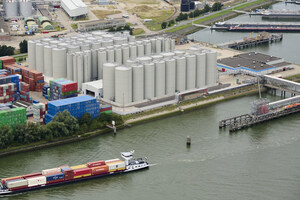Jakarta, August 4, 2020 /PRNewswire/ -- Golden Agri-Resources' (GAR) latest Sustainability Report entitled "Staying the Course" details GAR's commitment to continued implementation of the GAR Social and Environmental Policy (GSEP). Published amidst the COVID-19 pandemic, the report also provides a snapshot of the company's efforts to support employees and communities during the outbreak.
"Staying the Course, is a fitting description for the reality of working to achieve lasting sustainable practices within our own business and our wider supply chain. Major initiatives such as Traceability to the Plantation (TTP) and supply chain transformation, as well as continued work on delinking deforestation from production, are now showing significant traction and benefits, five years after we launched the GSEP," said Agus Purnomo, Managing Director, Sustainability, GAR.
"Industry-wide transformation, such as the palm oil sector has been undergoing, can only be achieved by daily on-the-ground effort. It requires the collaboration and support of all stakeholders – our employees, our suppliers, our financiers, our customers, and consumers. We have a shared responsibility to stay the course," he continued.
Report highlights include:
The achievement of nearly 80 percent TTP for GAR's entire palm supply chain, putting it on track to achieve the target of full TTP by end-2020 (subject to unforeseen delays due to the COVID-19 pandemic). Supply chain transformation backed by traceability continues apace through GAR's various deep engagement and capacity-building programmes. Workshops on traceability, responsible labour practices, and implementation of Free, Prior and Informed Consent (FPIC) were amongst those organised for suppliers in 2019.
Effective resolution of supply chain grievances based on a structured engagement approach. GAR was ranked by NGO Mighty Earth as the top ranking palm oil company in resolving grievances involving third-party suppliers.
GAR supports, directly and indirectly, the conservation of 144,000 hectares of forest area. 72,000 hectares of which are within GAR's own concessions with the rest within third-party supplier concessions and community areas. Last year, it joined an industry initiative to fund and support the development of increased surveillance of deforestation in Indonesia through radar monitoring.
Continued support to 40 Alternative Livelihood projects in partnership with local communities across Indonesia. These projects which include growing organic vegetables and other cash crops like coffee help improve rural farming communities' resilience and livelihoods, especially in times of crisis like the COVID-19 outbreak.
Other achievements include the reformulation of almost all consumer products like margarine and shortening to be free of trans fatty acids. To support its programme of yield improvement, GAR has produced about 2.5 million clones of super high-yielding clonal stock, Eka 1 and Eka 2 for replanting as of end 2019. These new clonals are capable of producing over 10 tonnes/ha/year of CPO, about three times the current national average yield in Indonesia.
Looking forward, the Chairman and CEO of GAR is confident GAR is well-positioned to stay the course: "GAR's strong vertically integrated business model and sustainable operations provide resilience during industry volatility and disruption, including the current COVID-19 pandemic. With the momentum we have gained over the years, we remain hopeful that we will stay on track and continue to provide sustainably produced and superior quality palm oil products, while creating value for all our stakeholders."
Photo - https://mma.prnewswire.com/media/1223154/Gambar_3.jpg
Photo - https://mma.prnewswire.com/media/1223156/Gambar_1.jpg
Logo - https://mma.prnewswire.com/media/1223155/Logo.jpg






Share this article